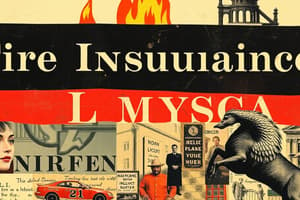Podcast
Questions and Answers
Which among the following is the regulator for the insurance industry in India? (Select all that apply)
Which among the following is the regulator for the insurance industry in India? (Select all that apply)
- Insurance Regulatory and Development Authority of India (correct)
- Life Insurance Corporation of India
- General Insurance Corporation of India
- Insurance Authority of India
Which among the following is a secondary burden of risk? (Select all that apply)
Which among the following is a secondary burden of risk? (Select all that apply)
- Setting aside reserves as a provision for meeting potential losses in the future (correct)
- Goods damaged cost (correct)
- Business interruption cost (correct)
- Hospitalisation costs as a result of heart attack (correct)
Which among the following is a method of risk transfer?
Which among the following is a method of risk transfer?
- Bank FD
- Equity shares
- Real estate
- Insurance (correct)
Which among the following scenarios warrants insurance?
Which among the following scenarios warrants insurance?
Which of the below insurance schemes is run by an insurer and not sponsored by the Government?
Which of the below insurance schemes is run by an insurer and not sponsored by the Government?
Risk transfer through risk pooling is called?
Risk transfer through risk pooling is called?
The measures to reduce chances of occurrence of risk are known as?
The measures to reduce chances of occurrence of risk are known as?
By transferring risk to the insurer, it becomes possible __________.
By transferring risk to the insurer, it becomes possible __________.
Origins of modern insurance business can be traced to?
Origins of modern insurance business can be traced to?
In insurance context 'risk retention' indicates a situation where?
In insurance context 'risk retention' indicates a situation where?
Which of the following statements is true?
Which of the following statements is true?
Out of 400 houses, each valued at Rs. 20,000, on an average 4 houses get burnt every year resulting in a combined loss of Rs. 80,000. What should be the annual contribution of each house owner to make good this loss?
Out of 400 houses, each valued at Rs. 20,000, on an average 4 houses get burnt every year resulting in a combined loss of Rs. 80,000. What should be the annual contribution of each house owner to make good this loss?
Which of the following statements is true?
Which of the following statements is true?
Why do insurers arrange for survey and inspection of the property before acceptance of a risk?
Why do insurers arrange for survey and inspection of the property before acceptance of a risk?
Which of the below options best describes the process of insurance?
Which of the below options best describes the process of insurance?
What is meant by customer lifetime value?
What is meant by customer lifetime value?
Identify the scenario where a debate on the need for insurance is not required.
Identify the scenario where a debate on the need for insurance is not required.
As per the Consumer Protection Act, 1986, who cannot be classified as a consumer?
As per the Consumer Protection Act, 1986, who cannot be classified as a consumer?
What does not go on to make a healthy relationship?
What does not go on to make a healthy relationship?
Which among the following is not an element of active listening?
Which among the following is not an element of active listening?
Which among the following is not a characteristic of ethical behavior?
Which among the following is not a characteristic of ethical behavior?
---------------------- is not a tangible good.
---------------------- is not a tangible good.
Flashcards are hidden until you start studying
Study Notes
Insurance Industry in India
- The regulator for the insurance industry is the Insurance Regulatory and Development Authority of India (IRDAI).
- Key organizations include Life Insurance Corporation of India and General Insurance Corporation of India.
Risk Management
- Secondary burden of risk includes business interruption costs, not direct losses such as goods damaged cost.
- Methods of risk transfer: Utilizing insurance is a key method over options like bank FD or equity shares.
- Insurance necessity arises when facing potential significant losses, such as untimely death of a family's breadwinner.
Insurance Schemes
- Non-government insurance schemes include options like Jan Arogya, not limited to government-sponsored schemes.
Risk Pooling and Retention
- Risk transfer through pooling is termed insurance; it allows for spreading risk among many.
- Measures to diminish risk occurrence are termed loss prevention.
- Risk retention implies choosing to bear and manage risk impacts.
Insurance Concept Understanding
- Transferring risk can enhance peace of mind and improve business planning.
- Modern insurance can trace its origins back to Lloyds.
- Retention in insurance means accepting risk rather than transferring it.
True Statements Concerning Insurance
- Insurance protects assets financially by compensating losses rather than preventing loss.
- Average contribution towards losses can be calculated based on combined loss and number of insured properties.
Insurance Process Insights
- Insurance is fundamentally a method of sharing the losses of many by a few.
- Customer lifetime value focuses on the sum of economic benefits from long-term relationships.
Consumer Classification and Relationships
- Under the Consumer Protection Act, 1986, a person purchasing goods for resale doesn't qualify as a consumer.
- Healthy relationships are built on trust, communication, and attraction rather than scepticism.
- Active listening does not include being judgmental; it requires attention, empathy, and appropriate responses.
Ethical Behaviour in Business
- Ethical behavior encompasses disclosure and the confidentiality of client information.
- Prioritizing clients' interests over self-interest is a hallmark of ethical conduct.
Tangibility of Goods
- Insurance is classified as a non-tangible good, contrasting with physical products like houses or mobile phones.
Studying That Suits You
Use AI to generate personalized quizzes and flashcards to suit your learning preferences.




